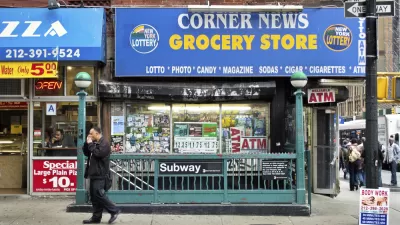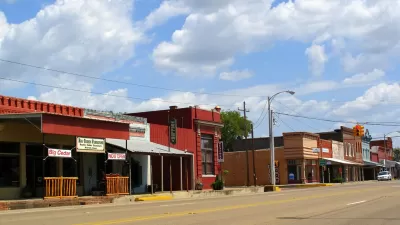The "food deserts" problem is receiving heightened attention following the release of the USDA's locator map. But this analysis relies on the suspect premise that suburban supermarkets are superior to small, walkable urban foodsellers.
Angie Schmitt at Streetsblog argues that all the hullabaloo over food deserts assumes that the cavernous suburban grocery store is the ultimate model of food distribution:
"While there is certainly a class of convenience store that lacks healthy food options, many analyses have completely ignored the presence of small, family-owned food markets and their important role in feeding urban populations."
Schmitt points to the USDA's own admission that their definition of what is a valid market is biased:
"Mary Reardon, a spokesperson for USDA said, "We define supermarkets and large grocery stores as food stores with at least $2 million in [annual] sales that contain all the major food departments found in a traditional supermarket."
"We do not address smaller outlets that have fresh food," she said."
Thanks to Angie Schmitt
FULL STORY: In Defense of the Corner Market

Planetizen Federal Action Tracker
A weekly monitor of how Trump’s orders and actions are impacting planners and planning in America.

Maui's Vacation Rental Debate Turns Ugly
Verbal attacks, misinformation campaigns and fistfights plague a high-stakes debate to convert thousands of vacation rentals into long-term housing.

Restaurant Patios Were a Pandemic Win — Why Were They so Hard to Keep?
Social distancing requirements and changes in travel patterns prompted cities to pilot new uses for street and sidewalk space. Then it got complicated.

In California Battle of Housing vs. Environment, Housing Just Won
A new state law significantly limits the power of CEQA, an environmental review law that served as a powerful tool for blocking new development.

Boulder Eliminates Parking Minimums Citywide
Officials estimate the cost of building a single underground parking space at up to $100,000.

Orange County, Florida Adopts Largest US “Sprawl Repair” Code
The ‘Orange Code’ seeks to rectify decades of sprawl-inducing, car-oriented development.
Urban Design for Planners 1: Software Tools
This six-course series explores essential urban design concepts using open source software and equips planners with the tools they need to participate fully in the urban design process.
Planning for Universal Design
Learn the tools for implementing Universal Design in planning regulations.
Heyer Gruel & Associates PA
JM Goldson LLC
Custer County Colorado
City of Camden Redevelopment Agency
City of Astoria
Transportation Research & Education Center (TREC) at Portland State University
Jefferson Parish Government
Camden Redevelopment Agency
City of Claremont





























